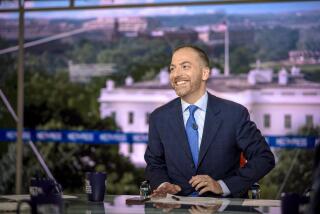The GOP Inside PBS
The Republican critics of public broadcasting have a point: It is outrageous that a medium supported by taxpayers should have a clear partisan slant.
So please, get the Republicans out of it.
Conservatives have been taking aim at the Corporation for Public Broadcasting for more than a decade. Their public argument is about cost: At a time of big deficits, the $400 million the CPB receives from the federal government looks to them like wasted money given that cable TV now offers many of the same types of programming. But a more visceral cause of the opposition is a perception that PBS and National Public Radio have a liberal bias.
The House took care of the first issue by trimming $100 million from the corporation’s budget Friday, though many Republicans had sought to slash twice as much; some of the money was restored by an amendment to the budget proposal passed Thursday. The response to the second issue has been more insidious.
WIth CPB Chairman Kenneth Y. Tomlinson, a Republican, on a quest to root out what he calls “imbalance,” PBS has made programming decisions that would be comical if they weren’t so scary. A show aiming to teach tolerance to children was spiked because it featured two lesbian moms; a documentary on Iraq was edited to remove profanity used by U.S. soldiers (do soldiers swear?). Tomlinson hired a GOP-connected outside consultant to view episodes of the current affairs show “Now” when it was hosted by Bill Moyers, grading segments on the degree to which they were “pro” or “anti” President Bush.
Tomlinson’s handpicked choice as president of the CPB is Patricia de Stacy Harrison, an ex-co-chair of the Republican National Committee. One of her former responsibilities was spreading pro-America PR messages in the Middle East. Some public station operators feebly expressed hope last week that Harrison could, by working amicably with Republican leaders, actually help PBS. That may depend on what Tomlinson demands of her.
In an era when commercial media are increasingly beholden to corporate conglomerates, public broadcasting plays an especially important role.
NPR offers about the only serious, comprehensive news on radio. Sure, you can get nature shows and BBC specials on cable -- but not everyone can afford $50 a month for basic cable. The CPB, which distributes taxpayer funds to public TV and radio stations, was created in 1967 to shield those stations from political considerations. Domination by ideologues thwarts the purpose for its existence.
Bush seems unlikely to heed a plea from 16 Democratic senators to remove Tomlinson. The thin silver lining is that his presence could do wonders for public broadcasting’s beg-a-thons.
More to Read
Sign up for Essential California
The most important California stories and recommendations in your inbox every morning.
You may occasionally receive promotional content from the Los Angeles Times.










